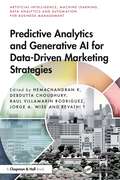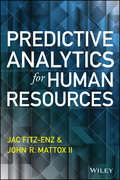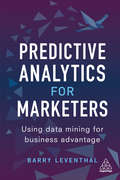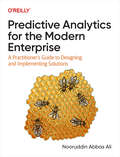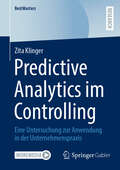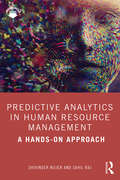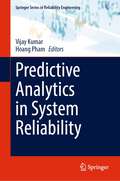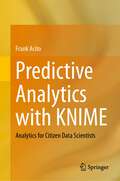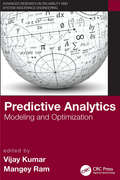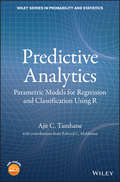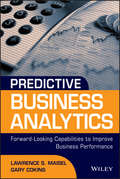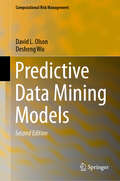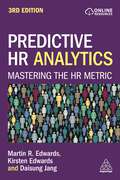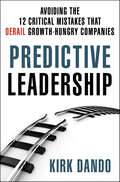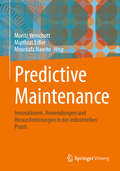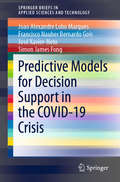- Table View
- List View
Predictive Analytics Using Rattle and Qlik Sense
by Ferran Garcia PagansIf you are a business analyst who wants to understand how to improve your data analysis and how to apply predictive analytics, then this book is ideal for you. This book assumes you have some basic knowledge of statistics and a spreadsheet editor such as Excel, but knowledge of QlikView is not required.
Predictive Analytics and Generative AI for Data-Driven Marketing Strategies (Artificial Intelligence, Machine Learning, Data Analytics and Automation for Business Management)
by Hemachandran K Raul Villamarin Rodriguez Debdutta Choudhury Jorge A. Wise Revathi TIn providing an in-depth exploration of cutting-edge technologies and how they are used to support data-driven marketing strategies and empower organizations to make the right decisions, Predictive Analytics and Generative AI for Data-Driven Marketing Strategies includes real-world case studies and examples from diverse marketing domains. This book demonstrates how predictive analytics and generative AI have been successfully applied to solve marketing challenges and drive tangible results. This book showcases emerging trends in predictive analytics and generative AI for marketing, and their potential impact on the future of data-driven marketing. This book is meant for professionals and scholars to gather the skills and resources to use predictive analytics and generative AI effectively for marketing strategies.This book: • Examines the different predictive analytics models and algorithms, such as regression analysis, decision trees, and neural networks, and demonstrates how they may be utilized to get insightful conclusions from marketing data.• Includes generative AI techniques, such as generative adversarial networks (GANs) and variational autoencoders (VAEs), showcasing how these techniques can generate synthetic data for marketing insights and decision-making.• Highlights the importance of data-driven marketing choices and illustrates how generative AI and predictive analytics may be quite useful in this context.• Integrates the principles of data science with marketing concepts, offering a cohesive understanding of how predictive analytics and generative AI can power data-driven marketing decisions.• Presents the recent advances in predictive analytics and generative AI and discusses how they can affect the area of data-driven marketing.
Predictive Analytics for Human Resources
by Jac Fitz-Enz John Mattox IICreate and run a human resource analytics project withconfidence For any human resource professional that wants to harness thepower of analytics, this essential resource answers the questions:"Where do I start?" and "What tools are available?" PredictiveAnalytics for Human Resources is designed to answer these andother vital questions. The book explains the basics of everybusiness--the vision, the brand, and the culture, and showshow predictive analytics supports them. The authors put the focuson the fundamentals of predictability and include a framework oflogical questions to help set up an analytic program or project,then follow up by offering a clear explanation of statisticalapplications.Predictive Analytics for Human Resources is a how-toguide filled with practical and targeted advice. The book startswith the basic idea of engaging in predictive analytics and walksthrough case simulations showing statistical examples. In addition,this important resource addresses the topics of internal coaching,mentoring, and sponsoring and includes information on how torecruit a sponsor. In the book, you'll find:A comprehensive guide to developing and implementing a humanresource analytics projectIllustrative examples that show how to go to market, develop aleadership model, and link it to financial targets through causalmodelingExplanations of the ten steps required in building an analyticsfunctionHow to add value through analysis of systems such as staffing,training, and retentionFor anyone who wants to launch an analytics project or programfor HR, this complete guide provides the information andinstruction to get started the right way.
Predictive Analytics for Marketers: Using Data Mining for Business Advantage
by Barry LeventhalPredictive Analytics has revolutionised marketing practice. It involves using many techniques from data mining, statistics, modelling, machine learning and artificial intelligence, to analyse current data and make predictions about unknown future events. In business terms, this enables companies to forecast consumer behaviour and much more. Predictive Analytics for Marketers will guide marketing professionals on how to apply predictive analytical tools to streamline business practices. Including comprehensive coverage of an array of predictive analytic tools and techniques, this book enables readers to harness patterns from past data, to make accurate and useful predictions that can be converted to business success. Truly global in its approach, the insights these techniques offer can be used to manage resources more effectively across all industries and sectors. Written in clear, non-technical language, Predictive Analytics for Marketers contains case studies from the author's more than 25 years of experience and articles from guest contributors, demonstrating how predictive analytics has been used to successfully achieve a range of business purposes.
Predictive Analytics for the Modern Enterprise: A Practitioner's Guide To Designing And Implementing Solutions
by Nooruddin Abbas AliThe surging predictive analytics market is expected to grow from $10.5 billion today to $28 billion by 2026. With the rise in automation across industries, the increase in data-driven decision-making, and the proliferation of IoT devices, predictive analytics has become an operational necessity in today's forward-thinking companies.If you're a data professional, you need to be aligned with your company's business activities more than ever before. This practical book provides the background, tools, and best practices necessary to help you design, implement, and operationalize predictive analytics on-premises or in the cloud. Explore ways that predictive analytics can provide direct input back to your businessUnderstand mathematical tools commonly used in predictive analyticsLearn the development frameworks used in predictive analytics applicationsAppreciate the role of predictive analytics in the machine learning processExamine industry implementations of predictive analyticsBuild, train, and retrain predictive models using Python and TensorFlow
Predictive Analytics im Controlling: Eine Untersuchung zur Anwendung in der Unternehmenspraxis (BestMasters)
by Zita KlingerDas vorliegende Buch zeigt, inwieweit Predictive Analytics (PA) im Controlling zur Forecast-Erstellung genutzt wird. Außerdem wird eine Handlungsempfehlung für die Implementierung eines PA Forecasts abgeleitet. Die Ergebnisse einer empirischen Untersuchung deuten darauf hin, dass PA bisher bei eher wenigen Unternehmen eingesetzt wird. Als Gründe hierfür werden insbesondere ein hoher Aufwand für den Aufbau von Know-how in Bezug auf PA und für die Implementierung in Bezug auf Zeit und Kosten von den Unternehmen angegeben. Die Ergebnisse zeigen, dass bei der Einführung eines PA Forecasts ein individuelles Vorgehen je Unternehmen erforderlich ist. Es können zwar die erforderlichen Prozessschritte und Best-Practice als Handlungsempfehlung definiert werden, allerdings ist bspw. die Auswahl der Position, für die der PA Forecast erstellt werden soll, von verschiedenen Faktoren abhängig, die von Unternehmen zu Unternehmen individuell geprüft werden müssen. Insgesamt hat sich gezeigt, dass durch den Einsatz von PA der Vorhersageprozess beschleunigt sowie die Vorhersagegenauigkeit erhöht werden kann. Die dadurch generierten Wettbewerbsvorteile für das jeweilige Unternehmen überwiegen in der Regel den erforderlichen Aufwand.
Predictive Analytics in Human Resource Management: A Hands-on Approach
by Shivinder Nijjer Sahil RajThis volume is a step-by-step guide to implementing predictive data analytics in human resource management (HRM). It demonstrates how to apply and predict various HR outcomes which have an organisational impact, to aid in strategising and better decision-making. The book: Presents key concepts and expands on the need and role of HR analytics in business management. Utilises popular analytical tools like artificial neural networks (ANNs) and K-nearest neighbour (KNN) to provide practical demonstrations through R scripts for predicting turnover and applicant screening. Discusses real-world corporate examples and employee data collected first-hand by the authors. Includes individual chapter exercises and case studies for students and teachers. Comprehensive and accessible, this guide will be useful for students, teachers, and researchers of data analytics, Big Data, human resource management, statistics, and economics. It will also be of interest to readers interested in learning more about statistics or programming.
Predictive Analytics in System Reliability (Springer Series in Reliability Engineering)
by Hoang Pham Vijay KumarThis book provides engineers and researchers knowledge to help them in system reliability analysis using machine learning, artificial intelligence, big data, genetic algorithm, information theory, multi-criteria decision making, and other techniques. It will also be useful to students learning reliability engineering.The book brings readers up to date with how system reliability relates to the latest techniques of AI, big data, genetic algorithm, information theory, and multi-criteria decision making and points toward future developments in the subject.
Predictive Analytics with KNIME: Analytics for Citizen Data Scientists
by Frank AcitoThis book is about data analytics, including problem definition, data preparation, and data analysis. A variety of techniques (e.g., regression, logistic regression, cluster analysis, neural nets, decision trees, and others) are covered with conceptual background as well as demonstrations of KNIME using each tool. The book uses KNIME, which is a comprehensive, open-source software tool for analytics that does not require coding but instead uses an intuitive drag-and-drop workflow to create a network of connected nodes on an interactive canvas. KNIME workflows provide graphic representations of each step taken in analyses, making the analyses self-documenting. The graphical documentation makes it easy to reproduce analyses, as well as to communicate methods and results to others. Integration with R is also available in KNIME, and several examples using R nodes in a KNIME workflow are demonstrated for special functions and tools not explicitly included in KNIME.
Predictive Analytics: Modeling and Optimization (Advanced Research in Reliability and System Assurance Engineering)
by Edited by Vijay Kumar and Mangey RamPredictive analytics refers to making predictions about the future based on different parameters which are historical data, machine learning, and artificial intelligence. This book provides the most recent advances in the field along with case studies and real-world examples. It discusses predictive modeling and analytics in reliability engineering and introduces current achievements and applications of artificial intelligence, data mining, and other techniques in supply chain management. It covers applications to reliability engineering practice, presents numerous examples to illustrate the theoretical results, and considers and analyses case studies and real-word examples. The book is written for researchers and practitioners in the field of system reliability, quality, supply chain management, and logistics management. Students taking courses in these areas will also find this book of interest.
Predictive Analytics: Parametric Models for Regression and Classification Using R (Wiley Series in Probability and Statistics)
by Ajit C. TamhaneProvides a foundation in classical parametric methods of regression and classification essential for pursuing advanced topics in predictive analytics and statistical learning This book covers a broad range of topics in parametric regression and classification including multiple regression, logistic regression (binary and multinomial), discriminant analysis, Bayesian classification, generalized linear models and Cox regression for survival data. The book also gives brief introductions to some modern computer-intensive methods such as classification and regression trees (CART), neural networks and support vector machines. The book is organized so that it can be used by both advanced undergraduate or masters students with applied interests and by doctoral students who also want to learn the underlying theory. This is done by devoting the main body of the text of each chapter with basic statistical methodology illustrated by real data examples. Derivations, proofs and extensions are relegated to the Technical Notes section of each chapter, Exercises are also divided into theoretical and applied. Answers to selected exercises are provided. A solution manual is available to instructors who adopt the text. Data sets of moderate to large sizes are used in examples and exercises. They come from a variety of disciplines including business (finance, marketing and sales), economics, education, engineering and sciences (biological, health, physical and social). All data sets are available at the book’s web site. Open source software R is used for all data analyses. R codes and outputs are provided for most examples. R codes are also available at the book’s web site. Predictive Analytics: Parametric Models for Regression and Classification Using R is ideal for a one-semester upper-level undergraduate and/or beginning level graduate course in regression for students in business, economics, finance, marketing, engineering, and computer science. It is also an excellent resource for practitioners in these fields.
Predictive Business Analytics: Forward Looking Capabilities to Improve Business Performance
by Gary Cokins Lawrence MaiselDiscover the breakthrough tool your company can use to make winning decisions This forward-thinking book addresses the emergence of predictive business analytics, how it can help redefine the way your organization operates, and many of the misconceptions that impede the adoption of this new management capability. <P><P>Filled with case examples, Predictive Business Analytics defines ways in which specific industries have applied these techniques and tools and how predictive business analytics can complement other financial applications such as budgeting, forecasting, and performance reporting. Examines how predictive business analytics can help your organization understand its various drivers of performance, their relationship to future outcomes, and improve managerial decision-making Looks at how to develop new insights and understand business performance based on extensive use of data, statistical and quantitative analysis, and explanatory and predictive modeling Written for senior financial professionals, as well as general and divisional senior management Visionary and effective, Predictive Business Analytics reveals how you can use your business's skills, technologies, tools, and processes for continuous analysis of past business performance to gain forward-looking insight and drive business decisions and actions.
Predictive Data Mining Models (Computational Risk Management)
by David L. Olson Desheng WuThis book provides an overview of predictive methods demonstrated by open source software modeling with Rattle (R’) and WEKA. Knowledge management involves application of human knowledge (epistemology) with the technological advances of our current society (computer systems) and big data, both in terms of collecting data and in analyzing it. We see three types of analytic tools. Descriptive analytics focus on reports of what has happened. Predictive analytics extend statistical and/or artificial intelligence to provide forecasting capability. It also includes classification modeling. Prescriptive analytics applies quantitative models to optimize systems, or at least to identify improved systems. Data mining includes descriptive and predictive modeling. Operations research includes all three. This book focuses on prescriptive analytics.The book seeks to provide simple explanations and demonstration of some descriptive tools. This second edition provides more examples of big data impact, updates the content on visualization, clarifies some points, and expands coverage of association rules and cluster analysis. Chapter 1 gives an overview in the context of knowledge management. Chapter 2 discusses some basic data types. Chapter 3 covers fundamentals time series modeling tools, and Chapter 4 provides demonstration of multiple regression modeling. Chapter 5 demonstrates regression tree modeling. Chapter 6 presents autoregressive/integrated/moving average models, as well as GARCH models. Chapter 7 covers the set of data mining tools used in classification, to include special variants support vector machines, random forests, and boosting. Models are demonstrated using business related data. The style of the book is intended to be descriptive, seeking to explain how methods work, with some citations, but without deep scholarly reference. The data sets and software are all selected for widespread availability and access by any reader with computer links.
Predictive HR Analytics
by Dr Martin Edwards Kirsten EdwardsWhere other functions of an organization deal in profits, sales growth, forecasts and strategic planning, the HR function is responsible for employee well-being, engagement and motivation. Such concerns do not immediately conjure up images of analytical know-how, despite the fact that in reality the management of such things often requires a lot of measurement and technical skill. Predictive HR Analytics provides a clear, accessible framework with which to understand and work with HR analytics at an advanced level, taking HR professionals through examples of particular predictive models so they can develop effective HR strategies based on evidence. Predictive HR Analytics will show step-by-step, using simple terms, how to carry out analysis (using the statistical package SPSS) and interpret the results, helping to communicate the potential of HR analytics and get the most out of the HR function, whether carrying out the analysis or briefing external consultants. The book will help deliver a credible and reliable service to businesses by providing metrics on which executives will be able to make sound business decisions.
Predictive HR Analytics: Mastering the HR Metric
by Dr Martin Edwards Kirsten Edwards Daisung JangThis is the essential guide for HR practitioners who want to gain the statistical and analytical knowledge to fully harness the potential of HR metrics and organizational people-related data.The ability to use and analyse data has become an invaluable skill for HR professionals to not only identify trends and patterns, but also make well-informed business decisions. The third edition of Predictive HR Analytics provides a clear, accessible framework for understanding people data, working with people analytics and advanced statistical techniques.Readers will be taken step-by-step through worked examples, showing them how to carry out analyses and interpret HR data in areas such as employee engagement, performance and turnover. Learn how to make effective business decision with this updated edition that includes the latest materials on biased algorithms and data protection, supported by online resources consisting of R and Excel data sets.
Predictive HR Analytics: Mastering the HR Metric
by Dr Martin Edwards Kirsten EdwardsHR metrics and organizational people-related data are an invaluable source of information from which to identify key trends and patterns in order to make effective business decisions. HR practitioners often, however, lack the statistical and analytical know-how to fully harness their potential. Predictive HR Analytics provides a clear, accessible framework with which to understand and work with people analytics and advanced statistical techniques. Step-by-step and by using worked examples, this book shows readers how to carry out and interpret analyses of various forms of HR data, such as employee engagement, performance and turnover, using the statistical packages SPSS (with R syntax provided), and, importantly, how to use the results to enable practitioners to develop effective evidence-based HR strategies.This second edition of Predictive HR Analytics has been updated to include new material on machine learning, biased algorithms, data protection and GDPR considerations, a new example using Kaplan Meier Survival analyses for tenure/turnover modelling and updated screenshots and examples with SPSS version 25. It is supported by a new appendix showing main R coding for the focal analyses approaches in the book, and online resources consisting of SPSS and Excel data sets and R syntax with worked case study examples.
Predictive Intelligence for Data-Driven Managers: Process Model, Assessment-Tool, IT-Blueprint, Competence Model and Case Studies (Future of Business and Finance)
by Uwe SeebacherThis book describes how companies can easily and pragmatically set up and realize the path to a data-driven enterprise, especially in the marketing practice, without external support and additional investments. Using a predictive intelligence (PI) ecosystem, the book first introduces and explains the most important concepts and terminology. The PI maturity model then describes the phases in which you can build a PI ecosystem in your company. The book also demonstrates a PI self-test which helps managers identify the initial steps. In addition, a blueprint for a PI tech stack is defined for the first time, showing how IT can best support the topic. Finally, the PI competency model summarizes all elements into an action model for the company. The entire book is underpinned with practical examples, and case studies show how predictive intelligence, in the spirit of data-driven management, can be used profitably in the short, medium, and long terms.
Predictive Intelligence für Manager: Der einfache Weg zur datengetriebenen Unternehmensführung – mit Self-Assessment, Vorgehensmodell und Fallstudien
by Uwe SeebacherDieses Buch beschreibt, wie Unternehmen pragmatisch und ohne externe Unterstützung den Weg hin zu einem datengetriebenen Unternehmen aufsetzen und realisieren können. Anhand des Predictive Intelligence (PI)-Ökosystems werden die wichtigsten Begriffe eingeführt und erklärt. Das PI-Reifegradmodell beschreibt in welchen Phasen Sie ein PI-Ökosystem im Unternehmen aufbauen können. Der PI-Selbsttest hilft Managern zu erkennen, von wo aus sie starten müssen. Zusätzlich wird erstmals ein Bauplan für einen PI-Tech-Stack definiert, das zeigt, wie IT-technisch das Thema unterstützt werden kann – die gute Botschaft: das geht ohne große Investitionen. Das PI-Kompetenzmodell fasst abschließend alle Elemente in ein Handlungsmodell für das Unternehmen zusammen. Das gesamte Buch ist mit Beispielen aus der Praxis untermauert. Drei Fallstudien zeigen, wie Predictive Intelligence kurzfristig, mittelfristig als auch langfristig im Sinne einer datengetriebenen Unternehmensführung gewinnbringend eingesetzt werden kann.Aus dem InhaltWarum nur mit Predictive Intelligence das Überleben in einer disruptiven Wirtschaft möglich istDer Unterschied zwischen Business Intelligence, Data Science und Predictive Intelligence.Die relevanten und wichtigen Begriffe im Umfeld der Predictive IntelligenceDas Vorgehens- und Kompetenzmodell zur Predictive IntelligenceDer Bauplan für den perfekten PI-Tech-Stack im Zusammenspiel mit Mar-Tech-Stack und Sales-Tech-StackDas Predictive-Intelligence-Team – das Kompetenz-Modell für dessen Aufbau und EntwicklungMit vielen Beispielen aus der Praxis, drei Fallstudien und einem PI-Self-Assessment
Predictive Leadership: Avoiding the 12 Critical Mistakes That Derail Growth-Hungry Companies
by Kirk DandoNothing masks issues and robs an organization of its full potential like success That's right! Most successful, growth-hungry companies begin to miss their projections or worse, not because demand is low or conditions are difficult, but simply because they don't know how to predict, nurture, or even maintain their own growth and success. At each stage of growth, natural problems are glossed over in the scramble to expand, making the organization vulnerable to chaos, no matter how strong or expert its leaders. Most leaders feel isolated, pressured to build on earlier success and maintain total control – the perfect recipe for the 12 most common and critical mistakes to show up and slow or kill growth.Kirk Dando, leadership and growth expert, CEO of Dando Advisors, calls these roadblocks the "12 Warning Signs of Success," and has helped leaders across industries predict, prepare, and avoid them at every stage of growth. Predictive Leadership is rich with real-world stories, prescriptive advice on how to scale your business and limit the drama so you can unlock the growth and success you desire.Maybe you had the right idea but hired the wrong person. Maybe you're running into a leadership bottleneck, having trouble getting your team aligned, unknowingly incentivizing failure, or losing sight of your core values. Dando, known in leadership circles as the "Company Whisperer," has encountered every one of these obstacles himself, as a C-level executive in a high-growth billion-dollar business. He knows firsthand that these moments of truth determine whether you can lead your company to become a strong, mature, and financially sustainable organization, or drift toward an uncertain future.
Predictive Maintenance: Innovationen, Anwendungen und Herausforderungen in der industriellen Praxis
by Moustafa Nawito Moritz Venschott Matthias EiflerDieses Fachbuch bietet eine umfassende Einführung in das Gebiet der Predictive Maintenance, beginnend mit den Grundlagen über aktuelle Entwicklungen bis hin zu zukünftigen Trends. Das Werk richtet sich an Fachleute in Wissenschaft, Forschung und Industrie, an Ingenieur*innen und Entscheidungsträger*innen, die ein vertieftes Verständnis für Predictive Maintenance erlangen und die neuesten Entwicklungen sowie deren praktische Anwendungen in verschiedenen Branchen kennenlernen möchten. Das Buch beginnt mit einer einleitenden Vorstellung und Einführung in das Thema. Es werden die Grundlagen von Predictive Maintenance vorgestellt, darunter zentrale Konzepte, Methoden und Technologien. Besonders im Fokus stehen Topographiedaten, elektronische Systeme und Sensornetzwerke, die eine Schlüsselrolle in der vorausschauenden Wartung spielen. Ein weiterer Schwerpunkt sind praxisnahe Fallbeispiele aus verschiedenen Branchen, darunter die voraussagende Instandhaltung in der Fertigungsindustrie, Medizintechnik und Hochtemperatur-Rohrleitungssystemen, die wertvolle Einblicke in die praktische Anwendung bieten.
Predictive Marketing: Easy Ways Every Marketer Can Use Customer Analytics and Big Data
by Dominique Levin Omer ArtunMake personalized marketing a reality with this practical guide to predictive analytics Predictive Marketing is a predictive analytics primer for organizations large and small, offering practical tips and actionable strategies for implementing more personalized marketing immediately. The marketing paradigm is changing, and this book provides a blueprint for navigating the transition from creative- to data-driven marketing, from one-size-fits-all to one-on-one, and from marketing campaigns to real-time customer experiences. You'll learn how to use machine-learning technologies to improve customer acquisition and customer growth, and how to identify and re-engage at-risk or lapsed customers by implementing an easy, automated approach to predictive analytics. Much more than just theory and testament to the power of personalized marketing, this book focuses on action, helping you understand and actually begin using this revolutionary approach to the customer experience. Predictive analytics can finally make personalized marketing a reality. For the first time, predictive marketing is accessible to all marketers, not just those at large corporations -- in fact, many smaller organizations are leapfrogging their larger counterparts with innovative programs. This book shows you how to bring predictive analytics to your organization, with actionable guidance that get you started today. Implement predictive marketing at any size organization Deliver a more personalized marketing experience Automate predictive analytics with machine learning technology Base marketing decisions on concrete data rather than unproven ideas Marketers have long been talking about delivering personalized experiences across channels. All marketers want to deliver happiness, but most still employ a one-size-fits-all approach. Predictive Marketing provides the information and insight you need to lift your organization out of the campaign rut and into the rarefied atmosphere of a truly personalized customer experience.
Predictive Modeling Applications in Actuarial Science
by Edward W. FreesPredictive modeling involves the use of data to forecast future events. It relies on capturing relationships between explanatory variables and the predicted variables from past occurrences and exploiting this to predict future outcomes. Forecasting future financial events is a core actuarial skill - actuaries routinely apply predictive-modeling techniques in insurance and other risk-management applications. This book is for actuaries and other financial analysts who are developing their expertise in statistics and wish to become familiar with concrete examples of predictive modeling. The book also addresses the needs of more seasoned practising analysts who would like an overview of advanced statistical topics that are particularly relevant in actuarial practice. Predictive Modeling Applications in Actuarial Science emphasizes lifelong learning by developing tools in an insurance context, providing the relevant actuarial applications, and introducing advanced statistical techniques that can be used by analysts to gain a competitive advantage in situations with complex data.
Predictive Models for Decision Support in the COVID-19 Crisis (SpringerBriefs in Applied Sciences and Technology)
by Simon James Fong Joao Alexandre Marques Francisco Nauber Gois José Xavier-NetoCOVID-19 has hit the world unprepared, as the deadliest pandemic of the century. Governments and authorities, as leaders and decision makers fighting the virus, enormously tap into the power of artificial intelligence and its predictive models for urgent decision support. This book showcases a collection of important predictive models that used during the pandemic, and discusses and compares their efficacy and limitations. Readers from both healthcare industries and academia can gain unique insights on how predictive models were designed and applied on epidemic data. Taking COVID19 as a case study and showcasing the lessons learnt, this book will enable readers to be better prepared in the event of virus epidemics or pandemics in the future.
Predictive and Simulation Analytics: Deeper Insights for Better Business Decisions
by Walter R. PaczkowskiThis book connects predictive analytics and simulation analytics, with the end goal of providing Rich Information to stakeholders in complex systems to direct data-driven decisions. Readers will explore methods for extracting information from data, work with simple and complex systems, and meld multiple forms of analytics for a more nuanced understanding of data science. The methods can be readily applied to business problems such as demand measurement and forecasting, predictive modeling, pricing analytics including elasticity estimation, customer satisfaction assessment, market research, new product development, and more. The book includes Python examples in Jupyter notebooks, available at the book's affiliated Github.This volume is intended for current and aspiring business data analysts, data scientists, and market research professionals, in both the private and public sectors.
Predilytics
by Annelena Lobb Robert F. HigginsThe management team at Predilytics, a healthcare analytics firm, must decide whether to accept a Series A venture capital financing deal. The company provided analytic services to healthcare plans, typically Medicare Advantage plans, in efforts to draw conclusions from massive amounts of patient data. The company still had enough funding from a seed round to operate on a low-key basis for a few more months, but the team hoped to move forward aggressively and scale its business. They also needed to make business choices about next steps.

